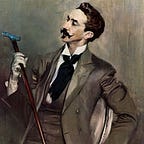Traveling to Your Drawers and Wardrobes With Bachelard: Poetics of Space
Bachelard helps us think of space and objects in new ways
If one goes to any university’s website for recent dissertations in literary studies, one can expect to find all kinds of interesting scholarship. People still write about Shakespeare and Proust using narratology and psychoanalysis, but newer, recent analyses in cultural studies complicate and enrich our knowledge of already complex works of art. With this contemporary approach, people use multiple literary works to explore ideas, places, living beings or even inanimate objects throughout history. This approach to studying literature has become the norm in literary studies relatively recently, so it is surprising to come across a work that already did it in the 1960s. Gaston Bachelard’s Poetics of Space (French: La Poétique de l’espace) explores the phenomenology of living at home using, in addition to his own experience, poems, novels, and short stories by an impressive number of authors. However, Bachelard’s book is more than just a precocious dissertation in cultural studies; while talking to his readers about corners in huts, snail shells, and drawers, he writes as if he were a toddler discovering these objects for the first time. Poetics of Space is a delightful work that successfully merges cutting-edge philosophy with prose so beautiful that it evokes poetry.
Poetics of Space begins with a brief introduction where Bachelard expresses poetry and art’s power to transcend rational thought while expressing complex ideas. It might seem an impasse to describe his object of study as futile to study, but Bachelard proceeds to do so anyway. The phenomenology of imagination is a quest so precious that one cannot just abandon. His first chapter connects the space known as home during childhood to one’s entire sense of perception — basically, where one lives as a child shapes one’s thoughts and emotions. Bachelard is hinting at an affect theory of objects decades before Laurent Berlant wrote about the power of affect in Cruel Optimism and before Latour revitalized object-oriented philosophy with Reassembling the Social. He proceeds with a chapter on drawers, closets, and wardrobes that insists once again on the emotions evoked by physical objects. The philosopher Henri Bergson, for instance, conceived of the mind as a place with drawers that one could pull information from. Novelists and poets have also used these taken-for-granted pieces of furniture in their work to express feelings as diverse as comfort, awe or intimacy. In Bachelard’s book, objects surpass their physicality and become concepts — chapters devoted to shells and nests, for instance, explore why the former evokes rebirth as in Botticelli’s The Birth of Venus and the latter evokes secrecy and coziness. The plentiful examples he uses from literary history demonstrate how well-read he was; one can’t help but be amazed to have compiled hundreds of mentions to the places he studies before the digital age made such tasks much easier (but on occasion still labor-intensive).
The second half of the book becomes more abstract by engaging with corners, miniature replicas, the dialectics of inside and outside, the concept of interior immensity, and roundness. Normally no one thinks much of any of these but we stumble upon them daily, sometimes dozens of times. While cleaning one’s home or going on a walk or walking the dog one comes in contact with a variety of categories of space that are easy to ignore — or are they? Bachelard proves that mentions of these in cultural objects demonstrate that we are not neutral towards them: they shape the way we think, the way we move, and possess a life of their own thanks to our minds. I cannot attest for how seriously philosophers take these ideas, but I still firmly believe Bachelard is pushing readers towards thinking about our being-in-the-world in a different way, one that is more aware and frequently amazed at the wonders of the world.
